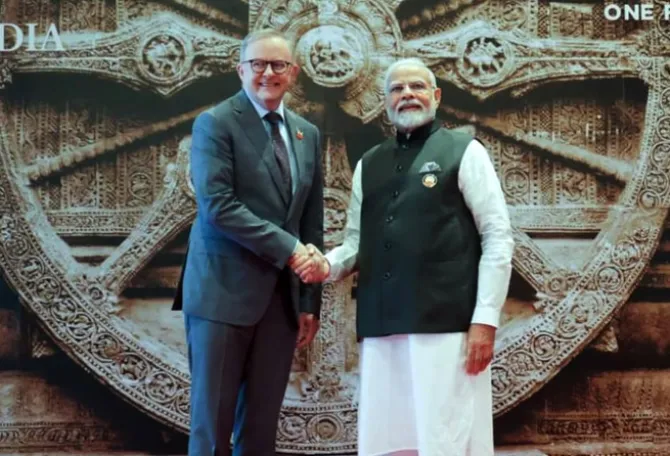
This article is part of the essay series, “India-Australia Partnership: The Defence Dimension”
In recent years, both Australia and India have made significant efforts to assist island states in the Pacific and Indian Oceans to help build resilience against a range of threats. There is considerable scope for the two to work together to build media resilience and combat disinformation from malign actors in the region. Island states in both the Indian and Pacific Oceans are facing similar problems. Financial and capacity constraints in the formal media sector make it difficult to keep pace with the rapid spread of information online. Meanwhile, China’s assistance through scholarships, training, equipment and other financial incentives is targeted to build influence that will enable the spread of propaganda and narratives that undermine other foreign partnerships. These island countries need support from external partners who want to uphold media as a pillar of democracy, protect the integrity of independent thought, and defend against malicious information operations.
China’s assistance through scholarships, training, equipment and other financial incentives is targeted to build influence that will enable the spread of propaganda and narratives that undermine other foreign partnerships.
In Pacific island countries, rumours of corruption, political upheaval, and financial opportunities that are too good to be true flood the information environment. In the confusion, there have been cases of journalists who have, by their own admission, inadvertently further spread false information. These inaccuracies, which further harm traditional media’s reputation, often come from inexperience and insufficient time to correctly check sources. Mistrust of traditional media creates an opportunity for false narratives to gain a foothold and for malign actors to manipulate information and populations. Some recent reports have showcased several examples where the Chinese Communist Party has sought to suppress the truth and undermine democracy and partnerships across Pacific islands by influencing media and spreading false information online. Resilience against the spread of false information, deliberate or inadvertent, can be built by providing greater financial support and by training journalists in small island nations. Although there is a concern that media freedom is regressing, the scale, complexity, and diversity in India’s rich media landscape offer many opportunities for strong collaboration and support. Further training on identifying false information, checking sources, and reporting on complex economic, political, or security issues would be welcomed: doubly so if it was delivered in the country to a broader audience of local media professionals rather than a few selected to travel overseas on scholarship or training opportunities.
Resilience against the spread of false information, deliberate or inadvertent, can be built by providing greater financial support and by training journalists in small island nations.
Support from the Australian Broadcasting Corporation International Development (ABCID)—involving the provision of equipment, training, exchanges, and other initiatives by media professionals but funded largely by the Australian government–has been highly valued in the Pacific, but the ABCID lack the capacity and funding to reach every island country and deliver on all development. Recently, the British Broadcasting Corporation Media Action, has also engaged with the Solomon Islands in their first foray into the region. Still, there is plenty of room for more partners to engage and media organisations remain in need of more support. There are lessons to be learnt from Australia’s long history of media engagement in the region, including the consequences of the recent downsizing in broadcasting presence which created space for others like China. India can also leverage Australia’s deep connections across the region to underpin media support. Think tanks, academics, and media professionals should be funded by the Australian and Indian governments to create networks of media professionals from Pacific and Indian Ocean island states to exchange views and experiences of the challenges in the media industry in an inclusive way. In many parts of the Pacific, this is referred to as ‘talanoa’ (which means “talk” or “discussion”). Through these networks, journalists and other media professionals could share stories and discuss solutions. Outlets that promote greater diversity and gender equality, such as the all-female Khabar Lahariya online network should alsotake part in these exchanges, building upon existing efforts to strengthen female representation in media. Australia and India could also help island states dream bigger when it comes to generating online media revenue. The size of the Australian customer base across a number of social media platforms provided leverage in wrangling a share of social media revenue from companies like Meta and Google for traditional media outlets through the news media bargaining code, an idea that is now spreading globally. Australia should offer to work with the Pacific Islands Forum to help develop a regional approach for securing revenue. India—which boasts the largest number of Facebook users in the world—can also make sure that Indian Ocean states are not left behind.
Outlets that promote greater diversity and gender equality, such as the all-female Khabar Lahariya online network should alsotake part in these exchanges, building upon existing efforts to strengthen female representation in media.
In addition to supporting media development, there are online challenges in combating disinformation that require cooperation at the political level. Online deception methods are evolving rapidly, using AI for text generation and deep-fake imagery. For populations, in many island nations that arestill gaining internet access, this level of deception will be difficult to detect. Disinformation may not be used by malign actors like China in isolation. Hybrid threats occur in coordination to target and undermine governments across the Indo-Pacific. Economic coercion, political interference, illegal fishing activities, and cyber-attacks are taking place across the region, initiated by both state and non-state actors, and require a coordinated response. Other scholars have proposed the establishment of an Indo-Pacific hybrid threats centre that would help regional governments, businesses, and civil society to understand the threat landscape, build resilience and counter malign activity in the region. Australia and India could cooperate in their support for the creation of a centre of excellence to address these threats. This could cooperate with existing structures like the Pacific Fusion Centre supported by Australia. Combatting disinformation involves more than just identifying false information. It requires an understanding between like-minded partners of how disinformation is being used to manipulate and meddle in internal affairs, directly or in conjunction with other hybrid threat actions—and how these nations and others are vulnerable to its spread. Cooperation between the largest partners of Pacific and Indian Ocean states should start with building resilience through financial independence and amplifying the voices of media in small island states. This article was written as apart of the Australia India Institute’s Defence Program undertaken with the support of the Department of Defence. All views expressed in this article are those of the author only. The author will address issues on disinformation and the island states at the Kolkata Dialogue: Australia and India working together to build island state resilience.
Blake Johnson is a senior analyst in the Australian Strategic Policy Institute’s Cyber, Technology and Security group.
The views expressed above belong to the author(s). ORF research and analyses now available on Telegram! Click here to access our curated content — blogs, longforms and interviews.




 PREV
PREV


